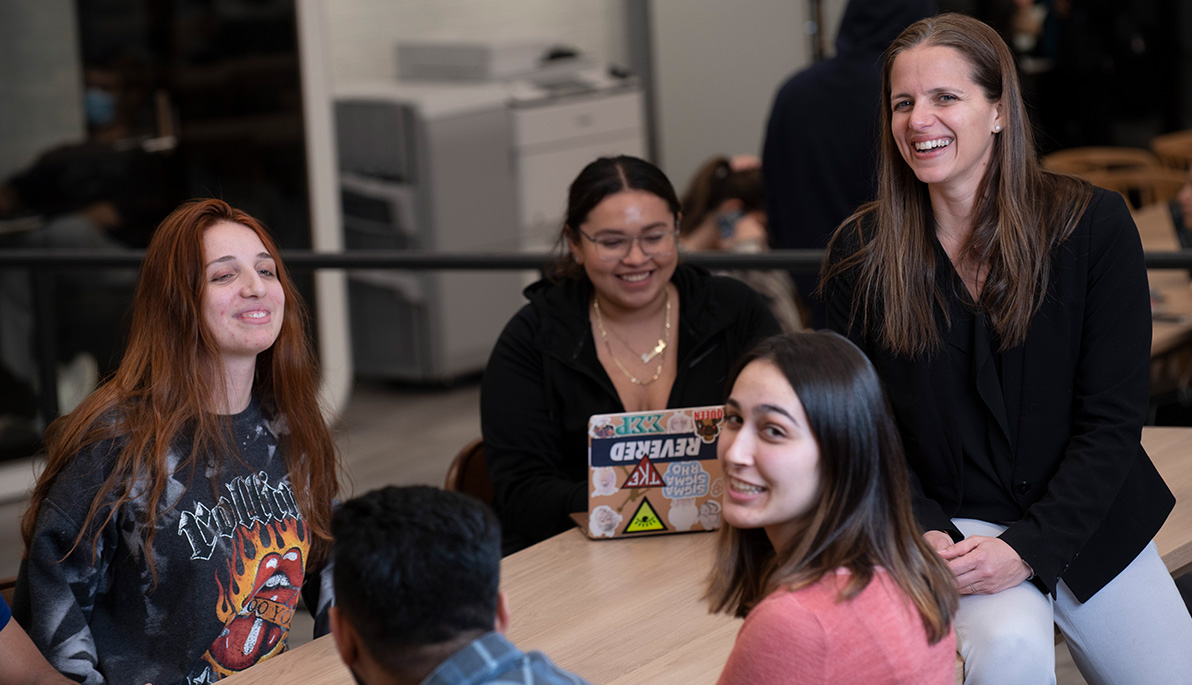
Leveraging Mentorship and Data to Improve Student Success
May 9, 2022
To fully support its diverse community of learners, New York Tech offers a variety of mentorship programs throughout a student’s career and uses real-time data to develop the right programs to put students on a path to lifelong success.
New York Tech’s programs are highlighted in the recent article, “Leveraging Mentorship and Data to Improve Student Success,” in The Chronicle of Higher Education.
While faculty often make up a large portion of college mentoring relationships, everyone and every situation is different. New York Tech’s large percentage of first-generation and underrepresented minority students also value friends, family, and staff who’ve worked to support their journey.
“We recognize that every member of our community has unique talents, interests, and life experiences that should be acknowledged and celebrated,” says Tiffani Blake, M.Ed., assistant provost for student engagement and development. “We take the time to train all our mentors in how to engage with different demographics, personalities, and characteristics. We want to encourage mentors to be open-minded to understand students’ distinct needs and where they want to go in life.”
In the wake of the COVID-19 pandemic and civic unrest in the United States and abroad, New York Tech has actively improved various programs to support students in their times of need, including a Student Emergency Fund to aid those impacted by unforeseen financial circumstances and the Bear Bytes initiative, which helps provide free, healthy food to students and their families.
Data collection and analysis also play an important role in ensuring that New York Tech administrators offer the right programs and continue to improve them based on measurable feedback.
Ongoing data analytics conducted by Research, Assessment and Decision Support (RADS) is helping to ensure that three complementary programs developed for undergraduates on the New York campuses are having their intended impact.
Launched last year, the First-Year GUIDE Program offers students starting college during the pandemic an opportunity to engage with the university and make new friends. Incoming first-year students are linked with Peer Success Guides—upperclassmen who are trained to interact with their own small group of students—offering them guidance, fielding newcomer questions, and organizing social events.
The iAchieve program helps second-semester freshmen whose grades have dropped below a certain level, while Achieving Collegiate Excellence (ACA) provides holistic support to sophomores and juniors who did not meet the GPA required to renew their scholarship.
In both ACE and iAchieve, students complete success modules developed by the academic success and enrichment team to help them build and finesse skills such as time management and metacognitive study techniques. But most impactful is the relationship with their assigned faculty or staff academic coach, who they connect with regularly throughout the semester.
“In addition to the emphasis on early support and academic assistance, academic coaches will spend the time getting to know the students and their challenges, which allows us to understand each student’s unique situation and offer them tailored solutions,” says Monika Rohde, senior associate dean of undergraduate student success and advising.
Ongoing data analytics by RADS shows that both programs are doing a world of good. ACE, for example, is helping to reduce or eliminate retention gaps in certain demographic populations, as well as improving New York Tech’s four-year graduation rate—a figure that had been at a standstill for several years.
This impressive achievement started with a commitment to data-informed decision making, and the ongoing success of the program is guided by a college-wide commitment to using data as a resource to help put students first.
Read the full article in The Chronicle of Higher Education.
This story is part of an initiative in which New York Tech has partnered with Inside Higher Ed and The Chronicle of Higher Education to offer strategic insights on key topics in higher education. This article is one of seven featured articles planned to run this spring.
Prior sponsored content articles include:
- “Building a Sustainable Experience,” in The Chronicle of Higher Education, details how New York Tech is meeting sustainability goals, rethinking campus buildings to prioritize outdoor space and nature, and fulfilling student needs for more lounge and leisure space.
- “Behind the Scenes of a Digital Transformation,” in Inside Higher Edfeatured an exclusive interview with New York Tech’s vice president for information technology and chief information officer on the multiple projects, increased personalization, and improved student experience that are the key pieces of New York Tech’s ongoing digital transformation.
- “The Power of Partnerships,” in The Chronicle of Higher Education, details how New York Tech is enhancing student experiences and outcomes through unique collaborations with industry partners.
- “Training Healthcare Professionals for a Diverse World,” in Inside Higher Ed, focuses on strategic approaches in medical and health education that are inclusive of race, ethnicity, sexual and gender identity, and differing abilities.
- “Space for Innovation,” in The Chronicle of Higher Education, focuses on the agreement between New York Tech and NASA to provide real-word experiences for students to work on technology prototypes.
- “Reinventing Teaching,” in Inside Higher Ed, highlights ways New York Tech professors use unconventional teaching methods, including improvisation, video games, and popular culture.
More Features

An Alumnus’ Commitment to the Environment
As an energy management graduate from New York Tech’s Vancouver campus, Jasdeep Gulati (M.S. ’22) is highly invested in educating people about environmental and climate sustainability.

Vancouver Faculty Win University-Sponsored Research Awards in New Program
The new Global Impact Research Grant (GIRG) program has been developed to keep Vancouver-based faculty connected to faculty and research projects being conducted on the university’s New York campuses.

Studying Climate Change One Degree at a Time
Junhua Qu (M.S. ’24) began her collegiate journey in Beijing. But, her interest in climate change took her to New York Tech’s Vancouver campus to study energy management.
